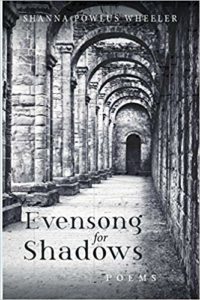Poet and writer Max Porter tells us that grief is a thing with feathers. Shanna Powlus Wheeler would say it might have feathers, but instead of flying, grief is something that’s always with us, hidden but ever-present even in times of joy. Like joy, grief is part of life.
The title of Wheeler’s first full poetry collection, Evensong for Shadows, suggests the omnipresence of grief. Evensong is sung in the evening, as the day wanes. Shadows are a picture of what substance is, or was. Grief is life, or very much a part of life, a measure of the loss of love or happiness or relationship or ability. The more intense the love, the greater the grief.
The opening poem, “After a Tour of Britain,” quietly introduces the theme. The poet is dreaming of “nameless ruined abbeys, / naves without roofs / like Holyrood in Edinburgh.” One thinks of Shakespeare’s “bare ruin’d choirs” in Sonnet 73, a lament of the passing of time and the approaching winter of old age.
Wheeler continues the theme of grief, with poems about C.S. Lewis grieving the loss of his wife, a widow’s lament, even the grief of being stopped by a policeman for speeding. One striking poem, reflecting the quality of the collection as a whole, is this one, a kind of “old age speaking to youth” statement.
What the Widow Wanted to Say to the Bride

if or when he’ll widow you.
Poor widow-me, poor widow-you
someday. You’ll see; he’ll smirk
in his last picture. Years now
but my closets still smell of him,
a sweet-sour musk. His white suit
a silent “Moonlight Serenade.”
Door hinges whistle “Bye Bye
Blackbird” like a dirge. So I moan
of loneliness, pester like a moth
your happy light. Get over it.
You’ll never get over widowhood.
I didn’t need to tell you.
Hear it? A lone gray dove sings
wi-dow-dow-dow on every wire.

Shanna Powlus Wheeler
The widow knows her words will likely fall on deaf ears, which is why the poem is about what she wanted to say, but didn’t. Old age knows better than to try to persuade youth that this has all been done before, and there’s nothing new under the sun.
Wheeler received a B.A. degree from Susquehanna University in 2004 and an M.F.A. degree from Penn State University in 2007. She previously published a poetry chapbook, Lo & Behold, and her poems have been published in a wide array of literary magazines and journals. She is director of the Writing Center and teaches in the English Department at Lycoming College in Williamsport, Pa.
Evensong for Shadows will make you remember and reflect. It will remind you that endings and grief are as much a part of life as beginnings and joy. And it speaks with beautiful words, images, and metaphors that will touch your heart.
Related: Poetic Voices: Susan Lewis and Shanna Powlus Wheeler
Photo by Mark Chinnick, Creative Commons, via Flickr. Post by Glynn Young.
__________________________

“I require all our incoming poetry students—in the MFA I direct—to buy and read this book.”
—Jeanetta Calhoun Mish
- Poets and Poems: Christina Cook and “Roaming the Labyrinth” - April 22, 2025
- Longfellow’s “Paul Revere’s Ride”: Creating a National Legend - April 17, 2025
- Poets and Poems: Katie Kalisz and “Flu Season” - April 15, 2025

Sandra Heska King says
“The more intense the love, the greater the grief.”
And wow. That poem.
“You should know, you never know
if or when he’ll widow you.”
Or you him.